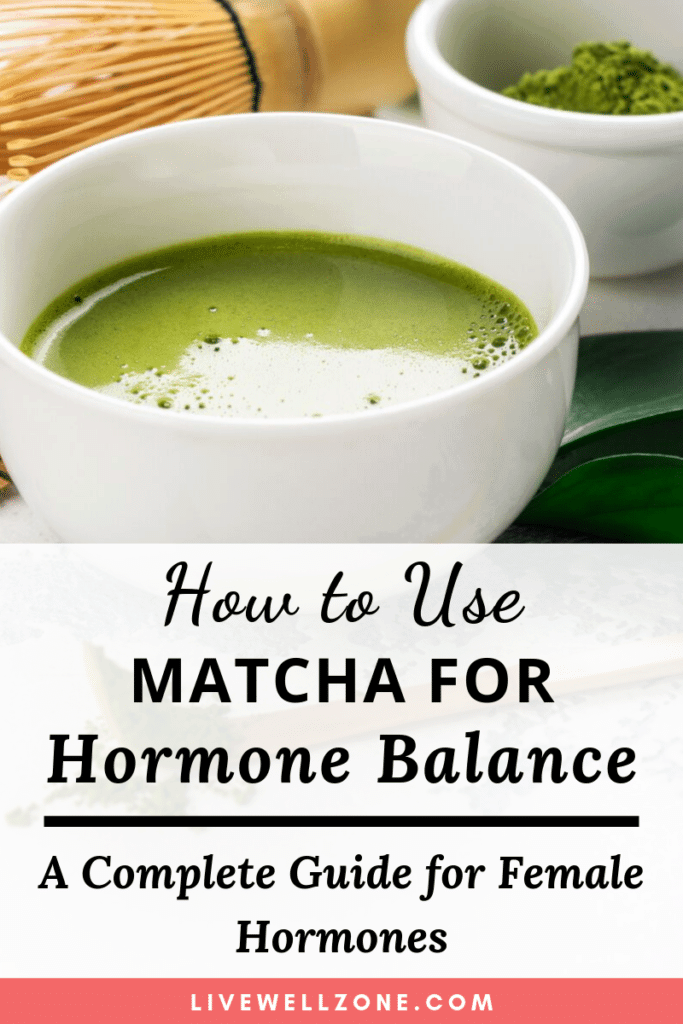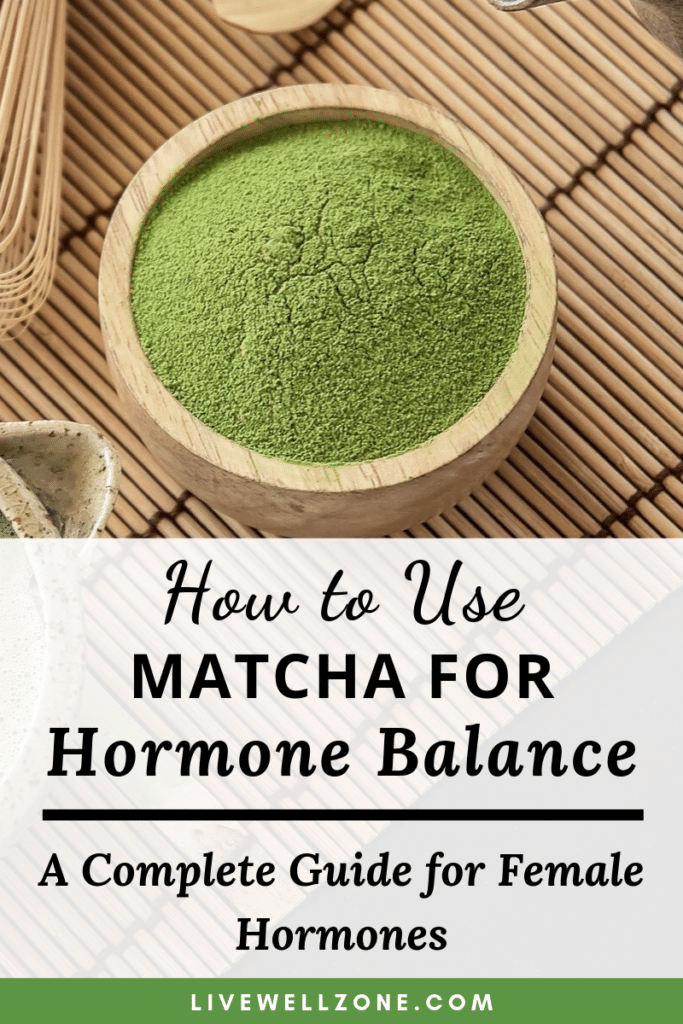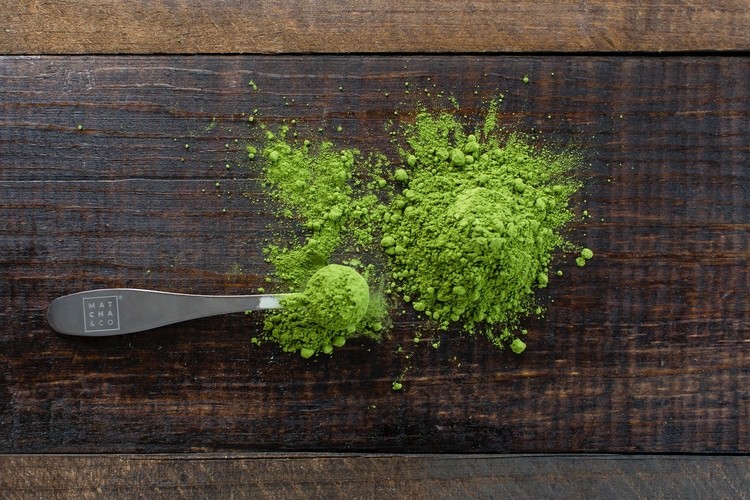
Whether you’re a green tea fan or not, I bet you’ve heard a lot about its health benefits.
And in recent years, a particular type of green tea, known as matcha, has grown in popularity.
Given that it has a long list of benefits, you may be wondering “is matcha good for hormones?”
Here’s the TLDR version:
Matcha contains a variety of compounds that reduce inflammation, support the liver, improve insulin sensitivity and more. This combination of factors means we can get lots of benefits from incorporating matcha into a holistic hormone support plan.
Now, if you want more of the details, then keep reading because in this post you will get the scoop on:
- how matcha benefits your hormones.
- how much matcha to drink for optimal health.
- the best ways to use matcha.
- how to choose a good quality matcha.
Note: this post contains affiliate links and I earn a commission – at no additional cost to you – if you use them to make a purchase.
BENEFITS OF MATCHA FOR HORMONE BALANCE
Even though matcha is green tea, it’s unique for 3 main reasons (source):
Powder form
- Matcha is made from the same leaves that are used for regular green tea, except that the leaves are ground up into a fine powder. So instead of drinking an infusion of the leaves, with matcha you are drinking the whole ground up leaf.
Shade-grown
- About 2 weeks before they are harvested, farmers place special structures over the green tea plants. As a result, the plants grow in the shade. The end result is matcha green tea leaves that are softer, brighter and higher in detox-friendly chlorophyll (we’ll talk more about this compound very shortly!).
Sweeter flavor
- While regular green tea has a bitter taste, matcha is sweeter. This makes it easier to incorporate into various recipes.
So, given all of the above, how does matcha actually support your hormones?
Let’s have a look!
1. Lowers Inflammation
Matcha contains a high concentration of anti-inflammatory compounds called polyphenols.
This is good news for your hormones because inflammation is the underlying cause of hormonal imbalances (you can learn more about inflammation and hormones in this post on hormone balance diets).
Now, what makes matcha particularly beneficial for inflammation is that you’re drinking the whole leaf in powder form.
So, you end up getting way more polyphenols than you would from simply steeping the leaves in hot water.
2. Increases Insulin Sensitivity
One of the most researched antioxidants in matcha is EGCG (epigallocatechin gallate).
EGCG has been shown to increase insulin sensitivity and regulate blood sugar (source).
This means EGCG can be very helpful for hormone-related issues like weight gain, PCOS or sleep problems (all of which are strongly influenced by insulin and blood sugar).
In fact, research shows that matcha generally has at least 3 times more EGCG than regular green tea (source).
3. Supports Liver Health
The liver is responsible for cleaning the blood and getting rid of excess hormones, plus other hormone disruptors.
This means that a healthy liver is essential for resolving hormonal imbalances once and for all.
Various studies show that matcha is effective at protecting liver health and reducing the risk of liver disease (source).
In addition, matcha has a high amount of chlorophyll. Not only does it give match a unique, neon green color but, it also impacts the liver.
This is because chlorophyll promotes the production of liver enzymes (which are responsible for getting toxins out of the body).
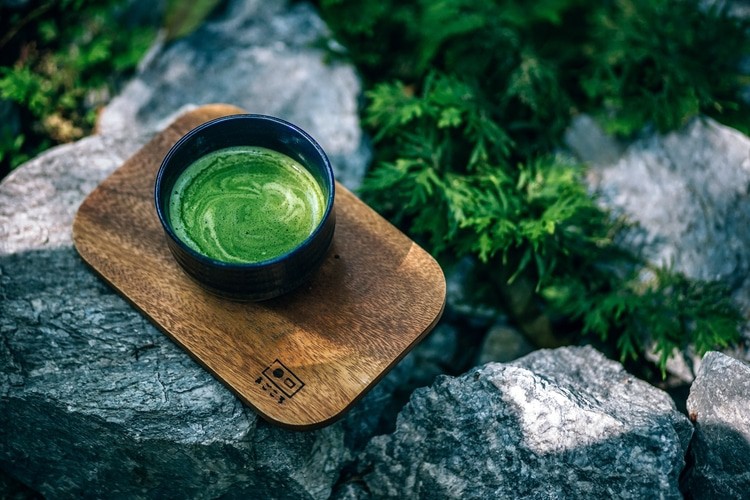
4. Lowers Stress and Cortisol
When we’re exposed to emotional stress or chemical stress (such as unhealthy food and toxins) the body produces cortisol.
Matcha contains a compound called L-theanine that has been shown to reduce stress and cortisol levels (1, 2)
Having lower cortisol levels means you are less likely to struggle with hormonal imbalance symptoms like insulin resistance, difficulty concentrating or fatigue.
5. Boosts Energy Without Giving You The Typical Jitters
Low energy is one of the tell-tale signs of hormonal imbalance.
And caffeine is one of the most popular ways of boosting energy.
However, caffeine places stress on the body, which can worsen inflammation and can make you feel jittery.
With matcha, things are quite different 🙂
You see, even though matcha contains caffeine, it doesn’t cause the same level of agitation as coffee.
This all seems to be due to the presence of, L-theanine, an amino acid that induces relaxation and alleviates anxiety (3, 4).
Note: even though matcha doesn’t seem to cause the same jitteriness as coffee, this doesn’t mean you should overdo it. As with all things, consume matcha in moderation and avoid over-relying on it.
6. Improves Sleep
Despite having caffeine, matcha is actually quite effective at promoting sleep and relaxation.
This is all thanks to the ingredient, L-theanine, which increases the hormones serotonin and dopamine, as well as the neurotransmitter, GABA (Gamma-Aminobutyric Acid).
All three of these chemicals are responsible for inducing relaxation, and therefore, they also help improve sleep (source).
Note: even though matcha has been shown to help with sleep, remember that it still contains caffeine. If you are particularly sensitive to stimulants like caffeine, then avoid drinking it close to bedtime.
7. Boosts Metabolism
Having a healthy metabolism has two main benefits:
- It supports weight loss.
- It allows all your metabolic processes (like sleeping, breathing and even, hormone production) to work more smoothly.
The main antioxidant in matcha, EGCG, is considered a thermogenic compound, meaning that it boosts metabolism (and helps the body to burn fat too) (source).
HOW MUCH MATCHA TO USE FOR HORMONE SUPPORT
Most of the research done on green tea shows beneficial results when people consume 100 to 200 mg of EGCG (source).
Depending on the brand and strength of your tea, this can be anywhere from 2 to 5 cups of matcha per day.
If you’re brand new to matcha, then start (for example, 1 or 2 cups per day).
Pay attention to how you feel and if needed, adjust your daily consumption.
CHOOSING THE BEST MATCHA GREEN TEA FOR HORMONE BALANCE
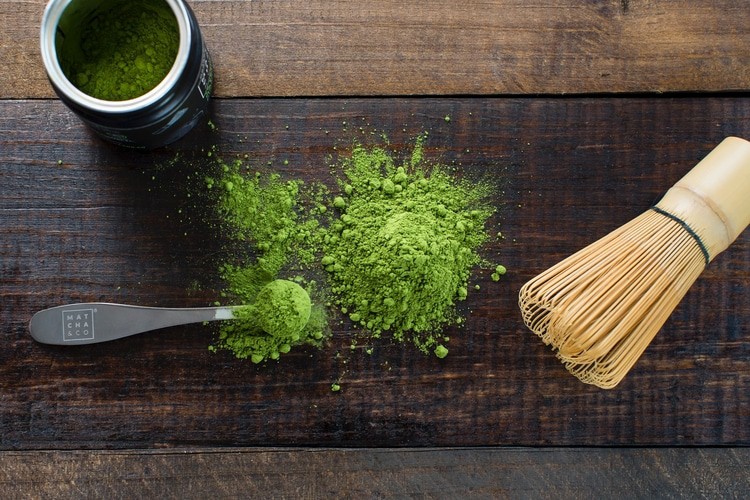
Before you head out and buy your own matcha, it’s important to know what to look for.
There are two types of matcha grades to choose from: ceremonial grade and grade A.
Ceremonial Grade Matcha
This is the best matcha to use because it’s made from high quality Japanese tea leaves that are ground between two large stones.
The quality of the leaves used, combined with the grinding process, means you get the best flavor, nutritional benefits and color from ceremonial grade matcha (source).
Grade A Matcha
This type of matcha is also called “cooking grade” matcha because it’s meant to be used in things like baked goods.
Grade A matcha is lower quality matcha. While it still contains all the matcha nutrients, the leaves used to make it are not the same quality as those used for ceremonial grade.
So this means you may not get the same concentration of nutrients as you would with ceremonial grade.
Grade A matcha is cheaper than ceremonial grade. But that probably doesn’t surprise you since it’s lower quality.
Now, as you have probably guessed, my recommendation is to stick to ceremonial grade matcha only.
After all, this is your health we’re talking about. Why settle for anything but the best?
HOW TO USE MATCHA GREEN TEA FOR HORMONE BALANCE
Now, we come to the fun part: how to use matcha for hormone balance on a day-to-day basis!
Here are some tips to get you started.
1. Add Into Yogurt
Next time you’re having yogurt, add in some matcha, cinnamon and honey for a new experience.
2. Mix Into Oatmeal and Other Healthy Cereals
If you enjoy eating oatmeal, puddings or granola then you can also add in some matcha.
Experiment with small quantities, say 1 tsp, to start and see what works best for your taste buds.
3. Make A Matcha Green Smoothie
Spinach and kale are not the only greens you can use in smoothies.
Throw in 1 to 2 tsp of matcha into a smoothie to change things up.
Here’s one of my favorite matcha smoothie recipes for hormone balance.
| Ingredients | How To Make |
| – 1 banana – 1 cup baby spinach – 1 tsp matcha – 1/3 cup cold coconut milk – 3/4 cup unsweetened almond milk | Place ingredients in a blender. Blend on high until smooth. |
4. Matcha Tea
Even though this post focused mainly on the health benefits of matcha, it’s actually a ceremonial tea in Japan.
Matcha has a special place in Japanese culture and making it is a delicate art.
To get started making your matcha tea at home, here’s a simple step by step guide.
5. Matcha Latte
Looking for a new latte experience?
Then how about a smooth and creamy matcha latte? Get the recipe here.
6. Try a Matcha Salad Dressing
Add some extra green to your salads with a matcha and tahini salad dressing.
Get the recipe here.
7. Add Matcha To Granola Bars
Trying to eat an anti-inflammatory, hormone-balancing diet isn’t always easy when you have a sweet tooth.
Keep your taste buds and hormones happy by using matcha in granola bar recipes, like this one.
BONUS DO’S AND DON’TS OF USING MATCHA FOR HORMONE BALANCE
First, keep the following pointers in mind: as you start using matcha for hormone balance:
- DO buy organically grown matcha. Since you’re drinking the whole leaf, you don’t want to worry about ingesting pesticide residue that is on the leaf.
- DON’T order matcha at coffee shops. They generally use Grade A matcha that is more likely to contain artificial sweeteners (and other artificial ingredients).
- DO look for brightly colored matcha. This is an indicator that it is good quality, not only nutritionally but also in terms of flavor and texture.
RELATED QUESTIONS
Is matcha ok for adrenal fatigue?
Since matcha causes less agitation, reduces cortisol and reduces stress, it can be beneficial for adrenal fatigue. Just make sure to consume moderately (about 2 cups a day) to start.
Is matcha tea good for PCOS?
Matcha green tea has been shown to improve insulin resistance and reduce testosterone levels in women with PCOS. Therefore, it’s a good idea to use green tea, in the form of matcha, for PCOS support.
Is Matcha good for your gut?
Since gut health is strongly influenced by stress and inflammation, matcha’s anti-inflammatory properties, can be very soothing for the gut.
CONCLUSION: DOES MATCHA GREEN TEA BALANCE HORMONES?
Matcha has anti-inflammatory, liver-friendly and detox-friendly properties that make it one of the best types of green tea for hormonal imbalance.
So, now that you’ve got the inside scoop on the what, why and how of using matcha for hormone balance, I’d love to hear your feedback.
Do already use matcha? Or has this article got you thinking about it?
Feel free to drop a comment below!
Related Posts:
Coconut Oil For Hormones: Benefits, How To Use and Bonus Recipe
How to Use Turmeric for Hormonal Imbalance Relief
3 Supplements For Female Hormonal Imbalance (you probably don’t know about)
Why You Need Turmeric for PCOS + 4 Ways To Use It
The Best Green Tea for PCOS: Benefits and How To Take
